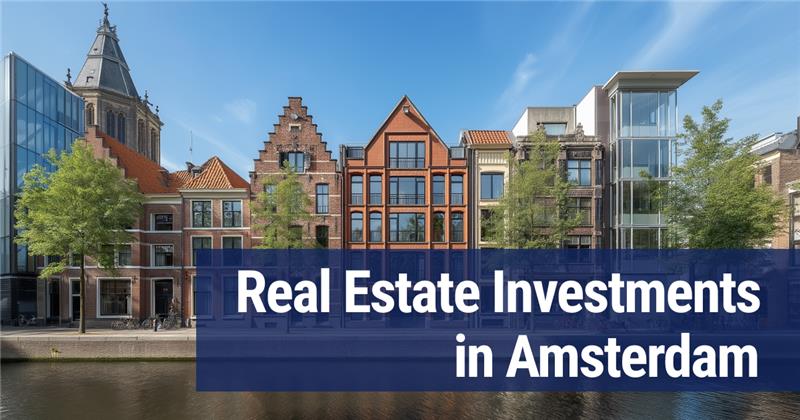Real Estate Investments in Amsterdam

We’ve prepared a real estate investment guide for Amsterdam, the capital of the Netherlands, which is considered one of the most unique cities in Europe thanks to its historic architecture, advanced infrastructure, and cosmopolitan atmosphere. In recent years, the city’s real estate market has attracted interest from international buyers. In this article, we will cover regulatory aspects, types of properties, local taxation and other important factors to consider before making a deal.
- Understanding the Local Market
- Key Considerations When Choosing an Investment Area
- Types of Real Estate in Amsterdam
- Regulation and Taxation: What You Need to Know
- Financing Real Estate Investments in Amsterdam
- Factors Influencing Property Prices
- Conclusion
Understanding the Local Market
When exploring real estate investment opportunities in Amsterdam, it’s important to understand the city’s different neighbourhoods, each of which has its own character property prices. The historic centre is known for its old buildings, picturesque canals and narrow streets, while newer districts offer modern projects with a focus on sustainability and innovation.
Key Considerations When Choosing an Investment Area
- City Centre (Centrum): Ideal for those interested in classic properties in a vibrant and tourist-friendly location.
- De Pijp: Known for its youthful vibe and trendy restaurants, this neighbourhood is suitable for small residential apartments.
- Amsterdam Zuid: A prestigious neighbourhood with convenient access to business centres and universities.
- Amsterdam Noord: A developing area with growth potential and new infrastructure.
- Oost and West: Areas that offer a mix of quality housing, parks and entertainment options.
Types of Real Estate in Amsterdam
When searching for an investment property in Amsterdam, several main types of real estate are available:
- Apartments in Historic Buildings: Feature a unique design and a classic living experience.
- Modern Apartments in New Developments: Equipped with advanced technology and designed for investors seeking easier management.
- Private Houses: Rarer within the city itself but available in nearby suburbs.
- Commercial Properties: Suitable for those looking to invest in small businesses, offices or retail spaces.
Regulation and Taxation: What You Need to Know:
Restrictions on Foreign Real Estate Investment
The Netherlands has laws regulating property purchases by foreign citizens. While there are no strict prohibitions, it’s important to check local regulations regarding rental or usage rights when investing in Amsterdam real estate.
Taxes When Purchasing Property
Buying property in the Netherlands involves additional costs beyond the purchase price, such as property transfer tax, notary fees and land registry charges. The transfer tax may vary depending on the type and intended use of the property.
Taxation on Rental Income
Renting out property in Amsterdam requires compliance with strict rules. It’s important to determine whether short-term rentals (such as through Airbnb) are permitted or if only long-term rentals are allowed. Rental income is taxable and should be considered when planning your investment.
Financing Real Estate Investments in Amsterdam
Buying property in the Netherlands can be financed through local bank loans, but banks often require substantial down payments from non-resident investors. Therefore, it’s worth exploring private financing options or loans from banks in your home country.
Factors Influencing Property Prices
Several factors may impact Amsterdam’s property values:
✔ Access to Public Transportation: Areas close to metro stations or major transit lines are typically more desirable.
✔ Proximity to Business Centres and Universities: Affects rental demand.
✔ Urban Development Plans: Infrastructure investments can increase the future value of an area.
✔ Regulatory Restrictions on Rentals: May affect the profitability of short-term rental investments.
Conclusion
Real estate investments in Amsterdam offer a wide range of opportunities for those interested in residential or commercial properties. However, before making a purchase, it’s essential to carefully examine different neighbourhoods, local regulations, tax obligations and financing options. It’s also recommended that you consult with local experts who specialise in the Dutch market to ensure a smart and well-informed investment.
